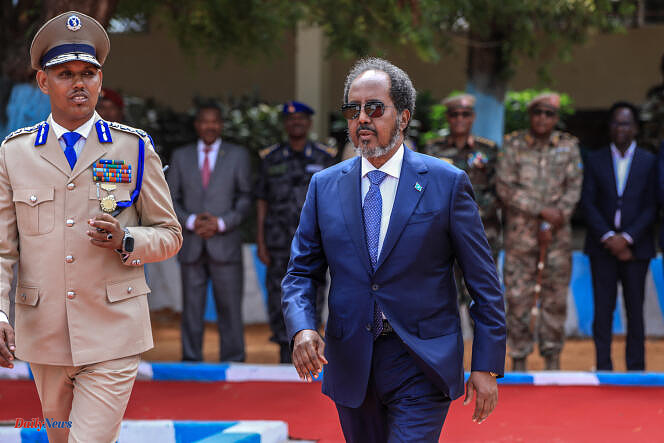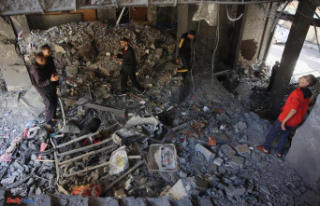The hope of seeing Somalia turn the page on three decades of stagnation is dwindling. The country, which in December 2023 obtained an agreement to reduce its debt, the lifting of the thirty-year-old arms embargo and its integration into the regional organization of the African Community. East (EAC), is once again bent under crises. The deterioration of the security situation and the secessionist risk, in particular, threaten the fragile successes achieved by President Hassan Cheikh Mohamoud, in power since May 2022.
The major armed offensive carried out for two years against the Chabab is stalling, due to a lack of military resources. The jihadist group affiliated with Al-Qaeda, which has terrorized the country for two decades, still controls large swaths of territory in the South. Since the military debacle of summer 2023, land operations have become rare. “Shabab is taking advantage of the tensions [linked to the regional elections scheduled for November] to reorganize and prepare the offensive on certain towns in Galguduud [central region] that they recently lost,” says the NGO Armed Conflict Location
Struggling with the Islamist threat and unable to combat it alone, the government asked the African Union (AU) on April 3 to create a new peacekeeping mission. The current force, Atmis, made up of around 17,000 Ugandan, Djiboutian, Ethiopian, Kenyan and Burundian soldiers, was initially scheduled to leave in December 2024, after seventeen years of presence. It will be replaced by a new force intended to protect the country's key infrastructure and train the army. The future mission should, according to several sources, scale down due to the reluctance of European donors to continue to finance alone the longest peacekeeping force on the continent.
Sharing with Mogadishu the fear of a security vacuum, the AU accepted the idea, which will be debated at the United Nations in May. “The Somali army is not yet able to generate enough soldiers to fight Al-Shabaab and control territories at the same time. Without our support, it is heading for disaster,” underlines a diplomat from the pan-African institution, on condition of anonymity. Beyond securing infrastructure, Atmis today participates in Somali military operations by offering air and artillery support.
Tensions with Ethiopia
Mogadishu does not want to see the halt in military operations against jihadist insurgents as an admission of weakness. “We were slowed down by the big floods in the fall and the tensions with Ethiopia,” claims an advisor to the Somali presidency. Indeed, Mogadishu and Addis Ababa are experiencing an unprecedented diplomatic crisis since the maritime agreement signed between Ethiopia and Somaliland in January to obtain Ethiopian access to the sea – which violates its territorial sovereignty, according to Mogadishu. On April 4, Somalia expelled the Ethiopian ambassador, accusing its neighbor of interfering in its internal affairs.
However, these diplomatic tensions are not enough to explain Somali procrastination. “The national army took advantage of the popular uprising of certain clans against the Chabab to go on the offensive in 2022, but since the civilian militias disengaged, the government is no longer moving forward,” notes Samira Gaid, an independent analyst . “The priority today seems to be more about political politics than military objectives for the government,” adds Ahmed Ahmed, researcher at the Somali Public Agenda research institute, citing in particular the upcoming regional elections and the revision constitutional.
Indeed, President Hassan Cheikh Mohamoud is reforming the Somali federal model with forceps. The current constitutional revision, which intends to centralize powers in the hands of the executive and establish universal suffrage, is not to the taste of certain regions and clans, who fear being marginalized in the new arrangement. The semi-autonomous province of Puntland (north) announced on March 31 that it no longer recognized “the institutions of the federal state”. The Puntland authorities, who collect their own tax and are not involved in the fight against Al-Shabaab, claim to have their own government until further notice.
With the defection of Puntland and the return of piracy off the Somali coast, headwinds are accumulating for Hassan Cheikh Mohamoud, already absorbed by the diplomatic crisis with Ethiopia and the Chabab insurgency. “It has fewer and fewer levers to act, faces a reinvigorated opposition and does not control even half of its territory,” summarizes a Western diplomat. At this stage, the Somali president's main asset lies in his external support (Turkey, United States, United Arab Emirates and European Union), which continues for the moment to finance the difficult reforms initiated by his administration.












